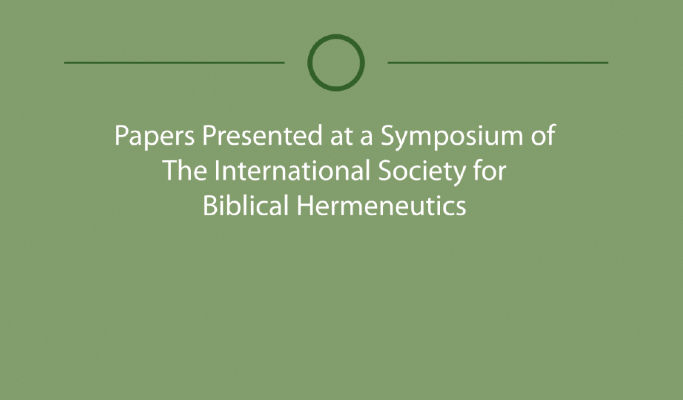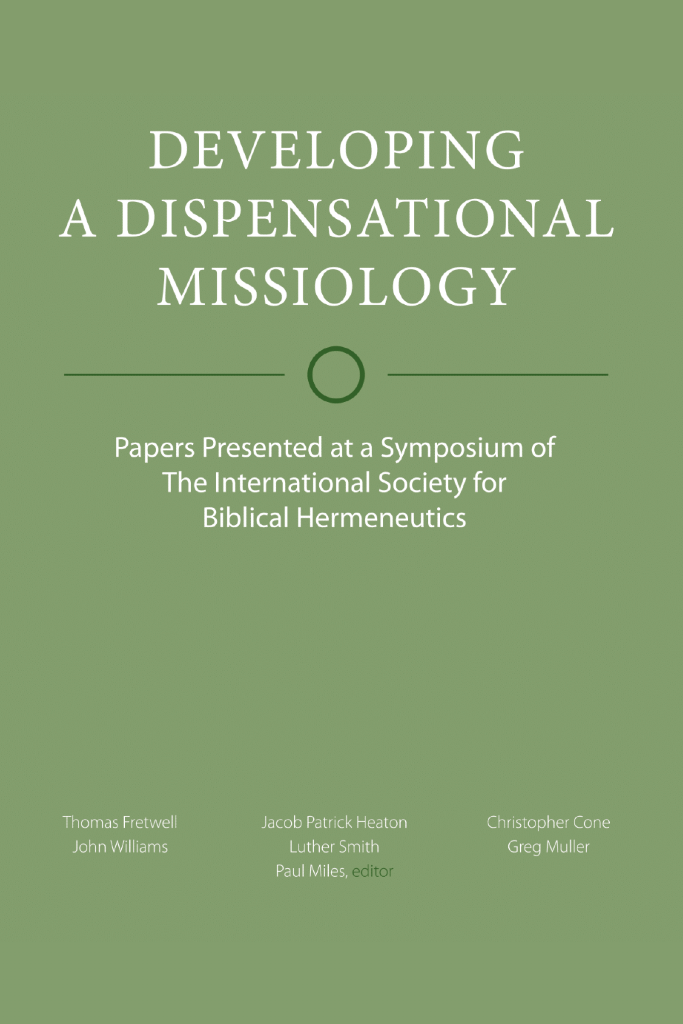Developing a Dispensational Missiology
The International Society for Biblical Hermeneutics had an online symposium on “Developing a Dispensational Missiology” in 2022.
Seven dispensationalist authors presented papers on missiology. Symposium attendees critiqued them and the papers have been published in an open-source volume. Here is that volume:
You can download a free electronic version of the book here (cover is here).
Abstracts:
Thomas Fretwell: Davidic Kingdom Theology: The premillennial Vision of a Socially Just and Ecologically Sustainable world
For many today the notion of premillennialism is perceived as being overly pessimistic and offers little reason to care or show concern for the created order. Caricatured as an “it is all going to burn anyway” mentality, this view has unfortunately become engrained in the popular misconceptions of premillennial eschatology. Its focus is seen purely to be an unhealthy occupation with the final days of this age which are said to be filled with eschatological judgement and deception. Yet, a theologically robust vision of premillennialism should focus more on the birth of the Kingdom, than the birth pangs themselves, albeit without ignoring the connection between them. When we recapture the future as envisaged under the reign of the Davidic King then we see exactly how both humanity and the created order will thrive under the right and just rule of the Messianic King. This is the true message of dispensational premillennialism, which offers a vision of hope for humanity and provides the ultimate solutions for the problems of the world. Yet, these are not presented as merely earthly pragmatic solutions operating through unjust systems and fallen people – they all find their ultimate consummation through the work of Christ and his righteous rule in the future Kingdom.
Paul Miles: Dispensational Kingdom Postponement Theology as a Safeguard from Secularized Trends in Evangelical Missiology
Many of the deviant missiologies that are infiltrating Christianity today are built on a framework that sees the church as being on a mission to build a spiritual kingdom on earth. This kingdom-building work is typically defined in terms that are grounded on the antibiblical foundations that the secular world calls “justice.” Dispensationalists derive a future, literal, and earthly Messianic Kingdom by turning to the Scriptures and accepting them for their plain sense. Part of the plain sense of Scripture is that Jesus came to Israel and offered to establish His kingdom on earth, but He was rejected, and so He postponed His kingdom to a future day. This doctrine of kingdom postponement is a hallmark of dispensationalism and is sufficient to defend a distinctly dispensational missiology from several deviant missiological trends in evangelicalism that rest on a kingdom-now framework.
John Williams: The ‘gospel message’ in the Gospel of John
Nearly two thousand years ago, a Philippian jailor asked a question that Christendom has wrestled with and fought over ever since. This is a question that through the ages has received a multiplicity of wrong answers, and only ever one correct answer. The question he asked was simply ‘what must I do to be saved?’ Battles between the true and false answers to this question have raged throughout the centuries; Paul contended with the Judaizers, the reformers contended with Rome, and in more recent times there are examples such as the Lordship salvation controversy. However, even among those who might be considered both dispensational and free grace, there is sometimes a disagreement as to what does, and what does not constitute the true gospel message. My purpose is to demonstrate that the gospel message that is presented in the gospel of John is the same gospel message presented in the epistles. It is my view that the message of salvation in the fourth gospel is in harmony with the gospel message preached by Paul, and distinct from the gospel of the kingdom preached in the early chapters of the synoptic gospels. In demonstrating this, I will also be seeking to refute the view that John’s gospel teaches a different gospel to the one found in Paul’s epistles, namely the gospel of the kingdom.
Jacob Heaton: A Re-Examination of the Great Commission
Following the literal, historical, and grammatical hermeneutic that is emphasized in dispensational theology perhaps the “great commission” needs to be re-examined. I will be taking the position that the commission that Christ gave to His 11 remaining disciples has been fulfilled. An argument for including this commission to Matthias (Acts 1: 26) as well as Paul (9:15) will also be made. The test of fulfillment will be the examination of the three areas of ministry listed in Matthew 28:18-20: 1) making disciples of all nations, 2) baptizing them in the name of the Father, Son, and Holy Spirit, and 3) teaching all that “I have commanded you.” By assessing the Apostles’ success in these three areas will determine the fulfillment of the Great Commission. This determination will also lead to a more accurate and clear responsibility of the Church after the Apostles departure. It will emphasize the role Scripture has in the Church as the written record of what the Apostles were charged in teaching the commandments of Christ. My thinking is that the sufficiency of Scripture argument can really be developed in a major way by the results of this abstract.
Luther Smith: Go Into All the Earth: A Dispensational Examination of Missions, Missiology, and the Great Commission
Missions, as popularly taught, have been a central activity in the body of Christ since its inception, and the primary Scripture used to make a case for missions, and a missional perspective is Matthew 28:18–20, the verses that are commonly called “The Great Commission.” This paper examines a brief history and perspective of the missionary movement throughout church history, observing the 15th century to the present day. The subject and the central tenets of “missional” are also discussed. Additionally, an examination of dispensational thought is considered in light of the Great Commission observing the sine qua non and a brief walkthrough of Matthew 28:18–20. The point is made that these verses, with good intentions, are used to stimulate missions’ activity in the body of Christ, however, these verses may be inconsistent with the sine qua non in dispensational thought and may have counterproductive implications for missions and missional work in the church economy. Finally, this paper will offer alternative verses that promote the activity of missions, missiology and remains consistent with the sine qua non of dispensationalism.
Christopher Cone: The Role of Literal Grammatical Historical Hermeneutics in Discipleship
From Paul’s exhortations to Timothy it is evident that the discipler is responsible to understand all that is communicated in the Scriptures, and to pass along that content. Because of the time necessary to teach Biblical content comprehensively, it would seem practically worthwhile to include in that training a methodology for understanding Biblical content so that the Learner can develop an independent learning capability (as the Bereans seemed to demonstrate) so that they can carry on the discipleship process beyond the discipler’s input. If on the other hand If it can be demonstrated that there is an internally derived hermeneutic method, then the discipler’s responsibility to teach a Biblical approach to hermeneutics extends beyond the mere practical advantages to a certain ethical responsibility in presenting Biblical content.
This paper asserts that the literal grammatical historical (LGH) method is the hermeneutic approach consistently modeled in Scripture, and consequently is part of not only the proper method for understanding Scripture, but is itself Biblical content. As such, the LGH is a necessary ingredient of any discipleship approach first for its preeminent status as Biblical content and secondly for its practical advantages. Consequently, the discipler should not present the LGH as a theological construction or an extra-biblical tool, but rather as one of the primary principles of God’s communication with humanity. In short, if the LGH is itself Biblical content, and if it is present in the earliest speech act interactions of God to humanity, then the role of hermeneutics – and LGH specifically – in discipleship is among the most focus worthy of Biblical truths for the discipleship process, or for the kind of learning that transforms.
Greg Muller: Timothy as a theological minority in 2 Timothy 3:14–4:4
In 2 Timothy 3:14–4:4 Paul instructs and encourages his student and young pastor friend Timothy to teach truth even through difficult circumstances. Much like the dispensationalist today, Timothy was also in the minority in his commitment to clarity as he led a group of believers in the first century church. This paper will examine what can be understood about secularism and what a teacher’s response from the instructions that Paul gives to Timothy.


